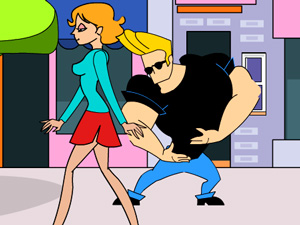Mariel DiDato, NJ, USA, SSH Blog Correspondent

As a child-turned-adult Pokémon fanatic, I have succumbed to the hype of Pokémon-Go. While basking in my nostalgia, I decided to watch some early episodes of the iconic cartoon. Watching childhood television shows as an adult, I often catch things that I didn’t pick up on as a kid. Certain jokes now make sense, while other things don’t seem as funny. One example of a less-funny aspect of Pokémon is Brock’s persistent advances towards almost every female character besides Misty, and the continued response of female annoyance or rejection. I wouldn’t necessarily claim this show is sexist, as they feature multiple female characters in leadership roles. However, the repeated romantic attempts towards much of these characters, played off with the “boys will be boys” narrative, is something I did not appreciate.
This prompted me to think about the other shows I watched as a child that normalized this kind of behavior. I realized that Pokémon is hardly the worst offender. Johnny Bravo is a show that features catcalling and female rejection as the main source of humor. Even more infamous is Pepe LePew, a male skunk whose storyline involves chasing and grabbing onto a female skunk who, very obviously, does not want to be approached or touched by him.
Although this harassment and female rejection is repeatedly portrayed as comical, the real-life version of this experience is far from laughable. On the Pokémon end of the spectrum, Brock takes rejection with a blushed face, and then moves onto the next woman. Johnny Bravo’s objects of affection sometimes even strike him, leading him to simply move on to his next target, like Brock. However, the reality of female rejection often leads to male escalation, with women receiving a spectrum of responses that can range from insults, threats, and actual violence. Women are aware of this fact; smiling and receiving compliments from harassers is often misconstrued as acceptance and openness, when it is really a method of de-escalation. It is sad to see this portrayed to young children as something to be laughed about. Even while LePew’s victim can be seen struggling to break free from his arms as he kisses her, the whole situation is trivialized to the point of comedy. It is as though harassment is seen as nothing more than a mere annoyance, generally harmless to the women it affects.
More and more data reveal that street harassment is anything but funny or harmless to its victims. Studies show that the continued street harassment most women face before the age of 18 is linked to a multitude of negative effects. One 2008 study found street harassment to be correlated with self-objectification and fear of rape. This, in turn, can lead women to fear travel of any distance, restricting their freedom of movement. In addition, there is evidence that continued and frequent abuse, such as the street harassment women can be subjected to virtually any time they leave their homes, can be more harmful than experiencing one traumatic event.
However, in these cartoons, sexual harassment is shown to be a trivial event that can be laughed off. Young boys are potentially learning that, while ineffective, street harassment is an acceptable way to pick up women. In each of these shows, there is an example of the male “getting the girl.” This might send the message that harassing multiple women is okay. Eventually, one will say “yes” and it will all be worth it. Plus, the women who say no will walk away irritated, but intact. On the other hand, young girls are potentially being taught that objectification and harassment is an appropriate and acceptable part of being female.
Street harassment was a problem prior to the invention of television. Misogynistic cartoon characters did not create the larger problem of sexism in society, but they are instrumental in keeping these messages alive and normalizing them for younger generations. It’s easy to criticize outright sexism on television, but it is also important to pick up on these more discreet messages that people of all ages are receiving. I don’t think I’m going to stop watching shows like Pokémon, but I will definitely be more aware of these indirect messages in the media. I will also be supporting shows that depict healthy relationships, instead of normalizing deeply harmful social interactions. I encourage others to do the same, and hopefully future generations will enjoy cartoons that don’t rely on sexism for their laughs.
Mariel is a recent college graduate, feminist, and women’s rights activist. Currently, she volunteers for a number of different organizations, including the Planned Parenthood Action Fund of New Jersey and the New Jersey Coalition Against Sexual Assault. You can follow her on Twitter at @marieldidato or check out her personal blog, Fully Concentrated Feminism.

